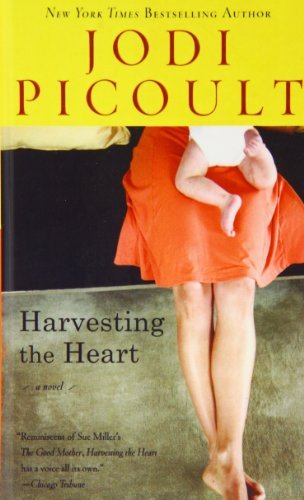I may be down to one post a week for a little while. I’m having to lie down a lot, and it’s hard for me to get a lot of work done, so I’m reassessing everything I can! Not only does the baby really take a lot of energy, but I’m having a lot of issues with my right wrist and it’s hard to type a ton so I need to prioritize writing when I can type. But I still want to post here when I can. So I’ll try once a week for now!
One nice thing about having to lie down a lot is that I’m finally getting more reading done. Any time I lie down if I’m not sleeping I try to do some reading. Plus any time I go anywhere in the car I listen to audiobooks. So that’s been really nice.
I have been alternating between fiction and nonfiction when it comes to audiobooks, and my latest one is Harvesting the Heart by Jodi Picoult. I had been wanting to try some of her work for awhile, and have been in a drama mood, so I rifled through the library’s selection and chose that particular volume because of the story’s emphasis on new motherhood. A good match for my current life stage, right?
Maybe not.
So far the writing is excellent and it’s very engaging. I’m only halfway through the book so I can’t completely assess it yet, but my feelings about it are definitely complicated. The characters feel real. The situations and reactions ring true. I can’t really recommend it, mostly because the descriptions of intimacy are a little bit too graphic for my taste (though not terrible, as worldly fiction goes). But all in all it’s a very good book so far (albeit a deeply tragic one).
All that said, on the surface, it shouldn’t be a very good book for me to read right now. It pretty much speaks to all my worst fears about marriage and motherhood. The main character, Paige, finds herself stuck in a marriage with little love and less understanding as she and her husband grow more and more distant. She has no real desire to be a mother, and when her baby is born she has no real connection to it or even feelings of love. Ultimately, she runs away and leaves her family behind, unable to take it anymore.
This should be very bad for my current emotional state. I hope the book ends well–like I said, I’m only halfway through, and I’m rooting, perhaps rather naively, for redemption later on. But in the meantime–can it really be good for me to immerse myself in this, when I have my own fears that one day my marriage will grow cold, or that I won’t love my baby like I want to?
It shouldn’t be good for me. Yet to my surprise, I haven’t found that it bothers me at all. If anything, the only practical effect it has on me is making me more grateful than ever for my husband. I usually end a listening session anxious to see him and give him a great big hug. But it hasn’t fed any of my anxieties. Why?
It took me awhile to realize why. Why the sorrows of this story bring me only gratitude rather than further worries. But I think I understand. I think it’s because the book and the motivations and the circumstances are so realistic that I don’t find them to be fear-inducing. The fact is, none of these tragic situations come out of thin air. The marriage isn’t distant and rocky for no reason. Paige has sad but understandable foundations for feeling the way she does about her child.
The fact is, their marriage was built hastily and impulsively on a lie. The fact is, Paige’s own mother left when she was a small child, giving her no understanding or example of what a mother should be. And the fact is that Paige herself had a secret teenage abortion that haunts her and colors her view of herself as a person and a parent.
I can look at these sad facts and I can understand that they are causes leading to the horrible effects of the story. I can easily look at my life and contrast it. My stable family environment. My Christian upbringing. My dedicated husband. My honest marriage. And I can instantly feel a sympathy for Paige while being filled with gratitude that my life is not hers.
There really is a power to a skillful copying of reality. Even in the saddest of stories, it can show us something about our own selves, our own world. It can prompt thoughts about truth and beauty and evil. This is what I aspire to. And this is why I’m grateful to be listening to Harvesting the Heart.
I still hold out hope for a happy ending. But more than that, I hold onto a sure hope for the happy ending of my own story.
